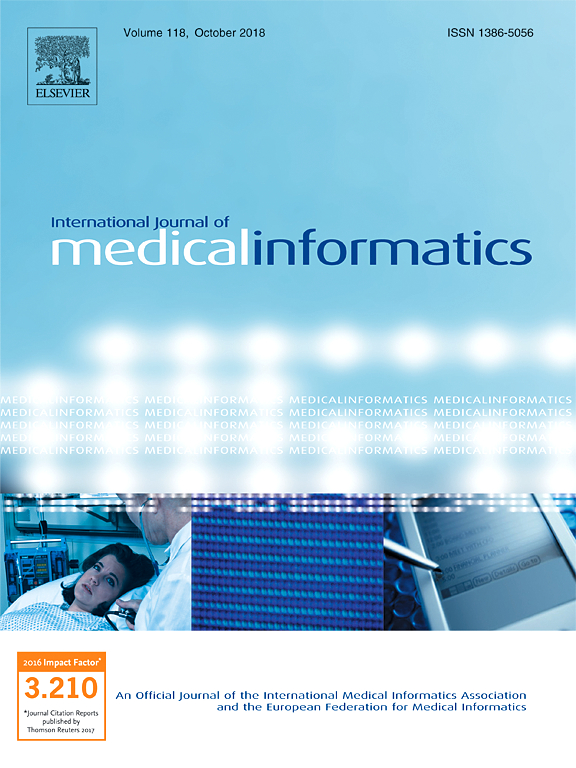
IJMI - 2022 - volume 158 论文列表 |
| 点击这里查看 International Journal of Medical Informatics 的JCR分区、影响因子等信息 |
Volume 158, Numbers February 2022
Peng Ouyang Jian-Jun Wang Ai-Chih Jasmine Chang
Machine learning using preoperative patient factors can predict duration of surgery and length of stay for total knee arthroplasty.Aazad Abbas Jacob Mosseri Johnathan R. Lex Jay Toor Bheeshma Ravi Elias B. Khalil Cari M. Whyne
Asbestosis diagnosis algorithm combining the lung segmentation method and deep learning model in computed tomography image.Hyung Min Kim Taehoon Ko In Young Choi Jun-Pyo Myong
Designing a professional development online short course to foster Learning Healthcare Systems.Dawn Choo Sathana Dushyanthen Kathleen Gray Daniel Capurro Mark Merolli Brian E. Chapman Douglas Pires Graeme K. Hart Kit Huckvale Wendy W. Chapman Kayley M. Lyons
Resuming elective surgery after COVID-19: A simulation modelling framework for guiding the phased opening of operating rooms.Hairil Rizal Abdullah Sean Shao Wei Lam Boon Yew Ang Ahmadreza Pourghaderi Francis Ngoc Hoang Long Nguyen David Bruce Matchar Hiang Khoon Tan Marcus Eng Hock Ong
Telecardiology interventions for patients with cardiovascular Disease: A systematic review on characteristics and effects.Niloofar Mohammadzadeh Sorayya Rezayi Mozhgan Tanhapour Soheila Saeedi
Image and structured data analysis for prognostication of health outcomes in patients presenting to the ED during the COVID-19 pandemic.Liam Butler Ibrahim Karabayir Mohammad Samie Tootooni Majid Afshar Ari Goldberg Oguz Akbilgic
Development of a knowledge mining approach to uncover heterogeneous risk predictors of acute kidney injury across age groups.Lijuan Wu Yong Hu Xiangzhou Zhang Jia Zhang Mei Liu
A decade of the Swiss electronic vaccination Record: Some insights based on an exploratory data analysis. Digital health in oncology in Africa: A scoping review and cross-sectional survey.Johnblack K. Kabukye Edward Kakungulu Nicolette de Keizer Ronald Cornet
Detecting model misconducts in decentralized healthcare federated learning. Usability barriers and facilitators of a human factors engineering-based clinical decision support technology for diagnosing pulmonary embolism.Megan E. Salwei Pascale Carayon Douglas A. Wiegmann Michael S. Pulia Brian W. Patterson Peter Hoonakker
The willingness to use mobile health and its influencing factors among elderly patients with chronic heart failure in Shanghai, China. Developing modular training components to support home hospital digital solutions: Results of a Delphi panel.Patricia Abril-Jiménez Beatriz Merino-Barbancho Cecilia Vera-Muñoz Irene Mallo de la Calle Samanta Villanueva Mascato Carlos Bibiano Guillen Raquel Pinuaga Orrasco Raúl Mallaina-García María Teresa Arredondo Waldmeyer Giuseppe Fico
Understanding nurses' perceptions of barriers and enablers to use of a new electronic medical record system in Australia: A qualitative study.Rebecca M. Jedwab Elizabeth Manias Alison M. Hutchinson Naomi Dobroff Bernice Redley
Beyond COVID-19: Prospect of telemedicine for obstetrics patients in Pakistan.Hira Sulaman Tasneem Akhtar Humera Naeem Gulshan Ara Saeed Shamin Fazal
Analyzing the use of artificial intelligence for the management of chronic obstructive pulmonary disease (COPD).Alberto de Ramón-Fernández Daniel Ruiz Fernández Virgilio Gilart-Iglesias Diego Marcos-Jorquera
Fine-grained spatial information extraction in radiology as two-turn question answering. Clinical decision support systems with team-based care on type 2 diabetes improvement for Medicaid patients: A quality improvement project.
